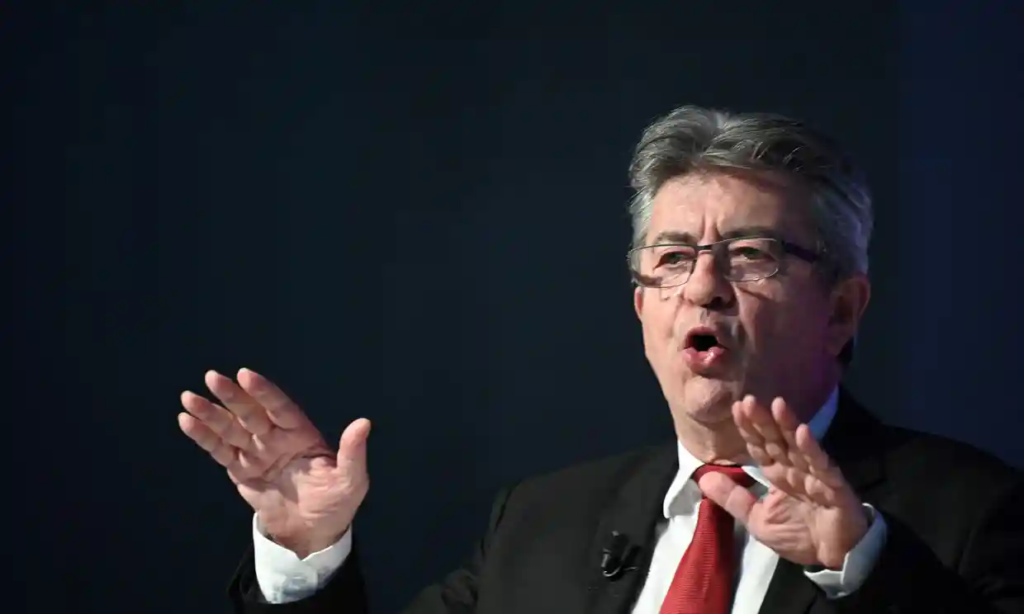
In 2017, Jean-Luc Mélenchon’s La France Insoumise (Unsubmissive France) sat alongside Spain’s Podemos, Greece’s Syriza, the Bernie Sanders campaign in the US and Labour under Jeremy Corbyn as part of a worldwide “left populist wave” that combined charismatic leadership with radical policies. He channelled French citizens’ anger at austerity policies – blamed on Brussels bureaucrats – and proposed an exit from the EU (in case treaty change was not achieved) and Nato. Mélenchon held rallies looking like an enraged tribune of the people in a Mao suit, and took swipes at the French elite: “the caste and its puppets” and the “ignoble” politicians of the socialist party. While his presidential bid scored an impressive 19%, only 11% voted for the party in the parliamentary elections.
The situation is very different now. A more amiable Mélenchon leads the Nupes (Nouvelle Union populaire écologique et sociale) coalition that polled a hair ahead of Macron’s Ensemble coalition in the first round of the French parliamentary elections this week – 26.1% to 25.8%. This is a stunning result for the left after decades on the margins. While it remains unlikely that Mélenchon will win enough MPs in the second round to claim the role of prime minister in an uneasy co-habitation with president Macron, a powerful case has been made for the attractiveness of a left alternative to Macron’s neoliberal centrism.
Key to this is Mélenchon’s own evolution from the populist insurgent accused of dividing the left and adopting a nationalist stance, to the politician who has managed to reunite the left for the first time in 20 years and convince the public it is fit for government. Other leftist projects that emerged in the turmoil of the 2010s may want to draw lessons from it.
Mélenchon’s 2022 strategy shifted from geopolitical issues in favour of bread-and-butter policies: raising the minimum wage to €1,500 a month after taxes, reducing pensionable age to 60 (Macron wants to raise it from 62 to 65), and the introduction of price controls to protect people from the cost of living crisis – pragmatic demands compared to the previous electoral cycle. As the University College London professor Philippe Marlière has noted, the Nupes programme is “radical reformist”, and contrary to the 1972 left unity programme, it does not specifically call for a “transitional break with capitalism”.
Alongside this, the 70-year-old Mélenchon has softened his revolutionary image. He has adopted a presidential tone, presenting himself as an able statesman who is aware of the need to find compromises with other parties and even certain sections of capital. The radical policies on the EU and Nato of 2017 that were particularly beloved by some left militants – but attracted wide criticism – has been bracketed as part of a common alliance programme. Furthermore, Mélenchon has emphasised his statesman credentials as a long-term politician and former minister and his readiness to govern.
From the leader of France’s Nupes coalition to Bernie Sanders, radical left firebands are shifting their focus and style
Mélenchon’s trajectory exemplifies a more general trend in the European and international left: many former left populists have now de facto become radical reformists: toning down their more identitarian rhetoric and anti-establishment antagonism to focus on the concrete policy solutions they have on offer. In Spain, the left has moved from the charismatic, sometimes rambunctious leadership of Pablo Iglesias to the more reassuring figure of Yolanda Díaz. Díaz is a labour lawyer from a family of trade unionists but is widely respected for her administrative competence and for delivering an effective furlough programme during the pandemic and on her promise to pass reform on temporary contracts. Significantly, her keyword is “diálogo” (dialogue): she insists that while defending the interests of workers, she wants to find a compromise with entrepreneurs in the general interest of the country.
During the 2010s, Sanders launched strong attacks against the establishment of the Democratic party in the US. But he has since tried to forge an uneasy alliance with Joe Biden against the obstructionism of centrist Dems such as Joe Manchin and Kyrsten Sinema, who have stalled the US president’s flagship Build Back Better social package. He now heads the powerful budget committee in the Senate and has tried to redirect economic policy discussion in Congress in a more progressive direction.
In the UK there has not been such maturation of the left populism of the 2010s into radical social democracy. Rather, the Labour leader, Keir Starmer, has almost completely abandoned Jeremy Corbyn’s policies without even doing much to try to co-opt some of his more promising young leaders and thinkers, as Biden has tried to do on the other side of the Atlantic.
Former leaders of the 2010s left-populist movement softening their stances doesn’t mean their original movement was wrongheaded. It was a necessary moment of recomposition and reconstruction of a new left identity for the 21st century. But the focus is now shifting away from identity-building to the more painstaking task of coalition-building and policy delivery rather than charismatic appeals. Many involved are aware that they were perhaps wrong to frame as “radical” and “uncompromising” policies that were often quite commonsense social democratic offers – had they been given a softer branding, these may perhaps have proven appealing also to people who do not necessarily define themselves as “anti-capitalists”.
Various opinion polls show that in Europe and the US, there is a wide section of the electorate looking for politicians and parties offering redistributive socio-economic policies to fight against ballooning inequality. These are policies that were once offered by traditional centre-left parties and figures that have since mostly abandoned any pretence of being social democratic and enthusiastically embraced liberal pro-market policy – as is most evident precisely in the case of Macron. The new left that emerged over the course of the 2010s can now step into that void. Socialism may have to wait, but social democracy is there to be claimed.

By Paolo Gerbaudo is a sociologist at Scuola Normale Superiore in Pisa, Italy, and King’s College London and the author of The Great Recoil – theguardian.com




 World Opinions Débats De Société, Questions, Opinions et Tribunes.. La Voix Des Sans-Voix | Alternative Média
World Opinions Débats De Société, Questions, Opinions et Tribunes.. La Voix Des Sans-Voix | Alternative Média




